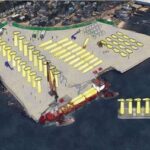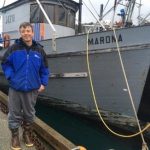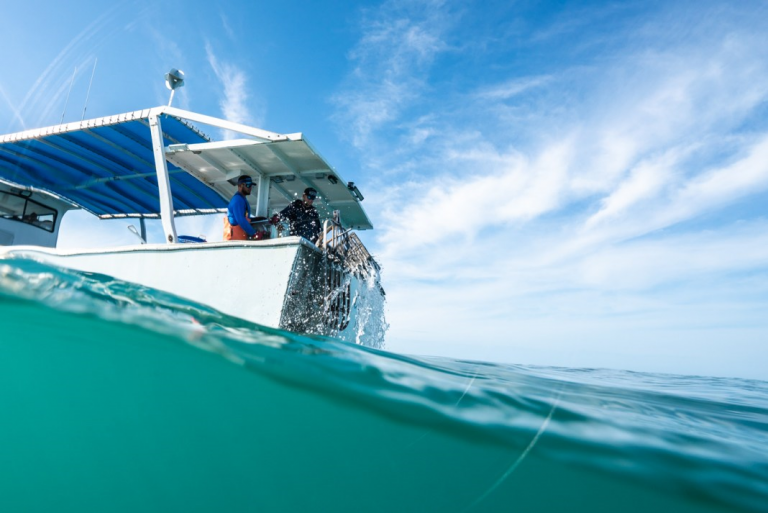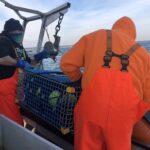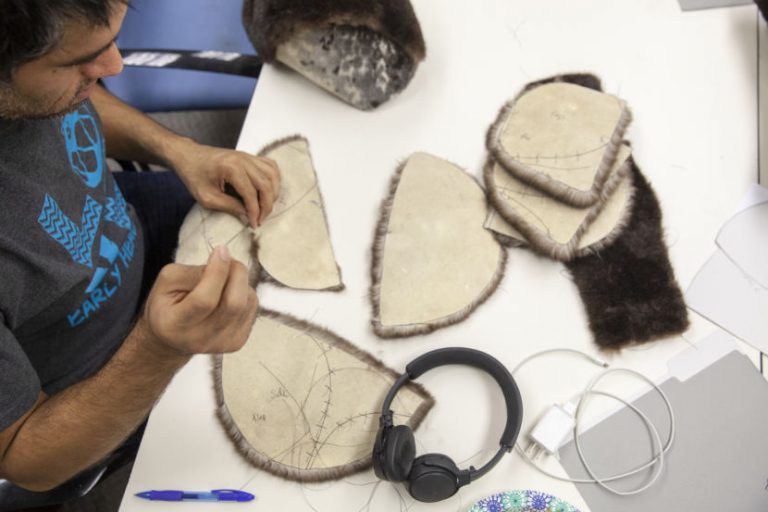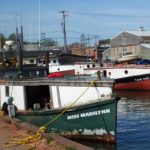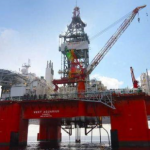Tag Archives: rationalization
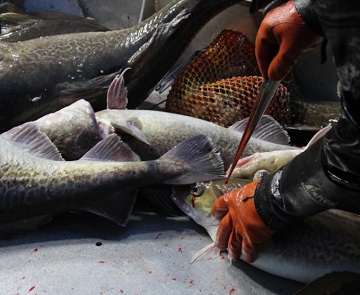
Catch Shares: Commercial trawlers to transition to quota system for Bering Sea and Aleutian Islands cod harvests
Starting in January, the fleet will fish under a “rationalization” system where each catcher vessel will have a maximum catch limit, which will be assigned through quota. The new regulations will require vessels trawling for cod in the area to form cooperatives, and quota will be administered through each co-op. Previously, the entire fishery had a total allowable catch that had to be caught within a certain amount of time. NOAA said this is the first time a catch share program has been implemented in Alaska since 2012. >>click to read<< 09:31
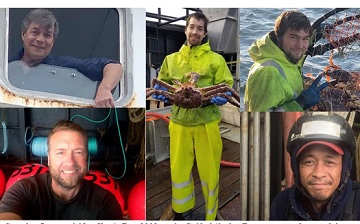
In Alaska, commercial fishing remains dangerous despite increased safety measures
Commercial fishing was once the most dangerous job in the country, (Scott Wilwert said, and during the 1970s and 1980s an increase in accidents and deaths ultimately led to the passage of the Commercial Fishing Industry Vessel Safety Act of 1988. The regulations required boats to have survival suits and life rafts and to carry out onboard safety drills, among other safety measures.,, “There was a time in the ’70s and ’80s where, I think, even the fishermen would tell you that there was a mentality, that ‘you have to go out but you don’t have to come back’ kind of thing,” Wilwert said. “That just doesn’t exist, nobody thinks that way anymore.” >click to read< 07:29
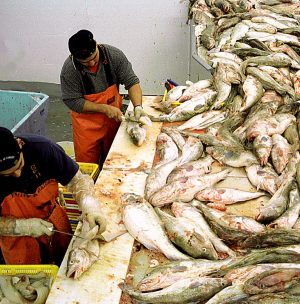
NPFMC takes first step toward rationalizing P-cod fishery
Pacific cod fishermen in the Bering Sea and Aleutian Islands, one of the last remaining unrationalized federal fisheries in Alaska, may finally have to cross that bridge. The North Pacific Fishery Management Council passed a motion at its meeting Feb. 9 to take action on the Pacific cod fishery, which is facing a number of issues in abundance, processing and participation. Depending on public review and the council’s action at the next several meetings, the Pacific cod fishery could see significant changes to seasons, limits and vessel participation. The motion hinges around an analysis developed on the trawl catcher vessel fishery and releases Alternatives 1, 2, 3 and 6 for public review separate from the rest. Rationalization, also known as catch shares,,, >click to read<
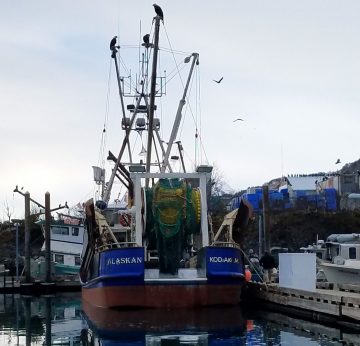
Graying of Alaska’s Fishing Fleet Puts Key Industry in Peril
Once known for its young guns, Alaska’s commercial fishing fleet is now full of graybeards. The average Alaska fisher is now older than 50, according to the University of Alaska’s Sea Grant program. That is a big change from 1975, when fishers under 40 held half of commercial fishing permits in rural Alaska.,,, At the heart of the problem, experts have concluded, is “rationalization,” the system that has transformed Alaska fisheries from an open-access free-for-all into tightly managed harvests governed by quota shares and “limited-entry” permits that must be inherited or purchased – with prices that can soar well above $100,000. >click to read< 09:00
No Catch Shares! Gulf rationalization dies a quiet death
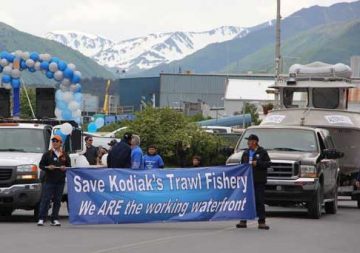 Gulf of Alaska groundfish will remain an open access fishery indefinitely after the North Pacific Fishery Management Council tabled a policy package that has enraged fishermen of all stripes over the last year. Depending on who is asked, the council acted at either its best or its worst with the decision. “The council process didn’t work. They didn’t solve the problem,” said Julie Bonney, executive director of the Groundfish Forum, an industry group of trawlers and processors. “They just took the political part first and ignored the management. I have to keep reminding myself, this isn’t about management. It’s about politics.” Others said the council did exactly what it should have done in the face of so many contentious decisions on which so many people expressed opinions. “I think this is actually the best illustration of council process, rather than the worst,” said Duncan Fields, a Kodiak attorney and former council member who was among the most vocal on this subject. “It shows that one gear group with a particular ideology and particular economic interest with very good advocates can’t just jam something through the council,” he said. “The council allows other participants, small boat fishermen, community, stakeholders to also have a voice, and that voice has said a catch share program is not the best public policy. You don’t always get the result you want.” Read the rest here 20:39
Gulf of Alaska groundfish will remain an open access fishery indefinitely after the North Pacific Fishery Management Council tabled a policy package that has enraged fishermen of all stripes over the last year. Depending on who is asked, the council acted at either its best or its worst with the decision. “The council process didn’t work. They didn’t solve the problem,” said Julie Bonney, executive director of the Groundfish Forum, an industry group of trawlers and processors. “They just took the political part first and ignored the management. I have to keep reminding myself, this isn’t about management. It’s about politics.” Others said the council did exactly what it should have done in the face of so many contentious decisions on which so many people expressed opinions. “I think this is actually the best illustration of council process, rather than the worst,” said Duncan Fields, a Kodiak attorney and former council member who was among the most vocal on this subject. “It shows that one gear group with a particular ideology and particular economic interest with very good advocates can’t just jam something through the council,” he said. “The council allows other participants, small boat fishermen, community, stakeholders to also have a voice, and that voice has said a catch share program is not the best public policy. You don’t always get the result you want.” Read the rest here 20:39
Catch Shares: After 10-year crab review, NPFMC seeks social impact information. Are they blind?
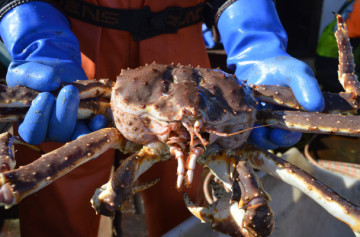 The North Pacific Fishery Management Council approved a 10-year review of rationalization on June 10, the program that ended derby-style crab fisheries in 2005 and gave quota shares to vessel owners, captains and processors. The aim was to reduce overcapitalization and create a safer fishery by allowing crew to fish slower with a guaranteed quota allocation compared to the previous free-for-all. The study – The 10-year review charted a continuation of trends found in the five-year review. Vessel consolidation continued along with quota consolidation, but both somewhat stabilized in the last five years. Fewer people hold quota than before. Each individual quota holder, naturally, holds more quota now than in 2004; 53 fewer people hold Bristol Bay red king crab crew shares now than in 2005. In the two years following rationalization, the crab fleet shrank from 256 vessels in 2004 to 91 in 2006. Read the rest here 12:49
The North Pacific Fishery Management Council approved a 10-year review of rationalization on June 10, the program that ended derby-style crab fisheries in 2005 and gave quota shares to vessel owners, captains and processors. The aim was to reduce overcapitalization and create a safer fishery by allowing crew to fish slower with a guaranteed quota allocation compared to the previous free-for-all. The study – The 10-year review charted a continuation of trends found in the five-year review. Vessel consolidation continued along with quota consolidation, but both somewhat stabilized in the last five years. Fewer people hold quota than before. Each individual quota holder, naturally, holds more quota now than in 2004; 53 fewer people hold Bristol Bay red king crab crew shares now than in 2005. In the two years following rationalization, the crab fleet shrank from 256 vessels in 2004 to 91 in 2006. Read the rest here 12:49
Keep ‘catch shares’ out of Gulf of Alaska fisheries
 Catch shares, also known as rationalization, transfers fishery access rights away from the general public and into the hands of current stakeholders by dividing up the annual catch into shares, called quota, and granting lifetime rights to quota owners. Shares can be bought, sold and leased on a largely unregulated market and typically result in massive consolidation of ownership and a transfer of fishing rights away from active fishermen, who cannot compete with the larger investment community in the market for these capital assets. more@alaskadispatch 05:51
Catch shares, also known as rationalization, transfers fishery access rights away from the general public and into the hands of current stakeholders by dividing up the annual catch into shares, called quota, and granting lifetime rights to quota owners. Shares can be bought, sold and leased on a largely unregulated market and typically result in massive consolidation of ownership and a transfer of fishing rights away from active fishermen, who cannot compete with the larger investment community in the market for these capital assets. more@alaskadispatch 05:51

































